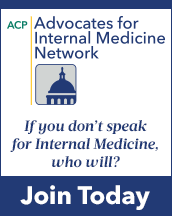Welcome to The ACP Advocate,
Realizing all of the trials and tribulations we all experienced in 2014, I want to welcome you to a New Year! With a new Congress beginning, and considering all of the dynamics that go with it, we’re faced with a huge number of challenges in our advocacy work. I look forward to sharing and discussing with you information about ACP’s advocacy efforts.
Our first article this issue looks at how states must decide whether to replace the federal pay parity program with a state version and whether to offer Medicaid to more residents.
Medicaid promises to be one of the biggest health care issues at the state level in 2015, as governors and legislators wrangle over expanding the program and extending a now-ended federal increase in Medicaid payment rates.
Our second article looks at a federal report that cites new statistics that reveal how hospital-acquired conditions, like infections, have fallen dramatically in the U.S. over the past few years, potentially saving tens of thousands of lives. The 17 percent improvement over four years is due, at least in part, to such provisions of the Affordable Care Act (ACA) as the Partnership for Patients initiative, according to the Department of Health and Human Services. Financial incentives tied to performance are having a positive effect on patient safety according to an ACP expert.
The final article in this issue explains that according to White House and independent estimates, 10 million people have gained health insurance coverage since the beginning of open enrollment under the Affordable Care Act. Looked at in another way, fewer people are uninsured. You’ll want to check out this article and learn more about the progress being made.
Until our next issue – when we’ll look at a just-released paper in which ACP makes recommendations to improve clinical documentation and electronic health records – and for more coverage of what's happening in Washington, take a look at my award-winning blog, The ACP Advocate Blog by Bob Doherty. You can also follow me on Twitter @BobDohertyACP.
As always, please send your feedback and suggestions on this newsletter to: TheACPAdvocate@acponline.org.
Yours truly,
Bob Doherty
Senior Vice President
Governmental Affairs and Public Policy
American College of Physicians
|
|
| In the news |
| » |
2015 Brings New Challenges for Medicaid
States must decide whether to replace federal pay parity program with a state version and whether to offer Medicaid to more residents
Medicaid promises to be one of the biggest health care issues at the state level in 2015, as governors and legislators wrangle over expanding the program and extending a now-ended federal increase in Medica... (read more)
|
|
| » |
Federal Report Cites Decline in Hospital-Acquired Infections
Financial incentives tied to performance are having a positive effect on patient safety, ACP expert says
New statistics reveal that hospital-acquired conditions like infections have fallen dramatically in the United States over the past few years, potentially saving tens of thousands of lives.
A f... (read more)
|
|
|
|
|
|
 |
| In focus |
| » |
PQRSwizard |
|
There's still time to participate in 2014 PQRS to receive 0.5% incentive in 2015 and avoid the -2% penalty in 2016. ACP offers PQRSwizard - a fast and cost-effective online qualified registry tool to collect and report quality data. It requires as few as 20 patient records per provider, minimizes data entry time, and validates data automatically. The reporting deadline for using PQRSwizard is Feb. 26, 2015. |
| » |
Report: Interprofessional Training to Deliver Patient-Centered Care |
|
A new report by the Patient-Centered Primary Care Collaborative (PCPCC) highlights programs that train medical students, residents, nurse practitioners, nurses, physician assistants, social workers, psychologists, and other health professionals to work effectively in teams. The publication will serve as a learning resource on interprofessional education and provide a framework for educating the next generation of health professionals in team-based primary care models. |
|
| About this newsletter |
| The ACP Advocate is an e-newsletter, edited by the College's Washington, DC governmental affairs division, created to provide you, our members, with succinct news about public policy issues affecting internal medicine and patient care. To learn more about ACP's Advocacy and to access the ACP Advocate archives, go to www.acponline.org/advocacy. |
|